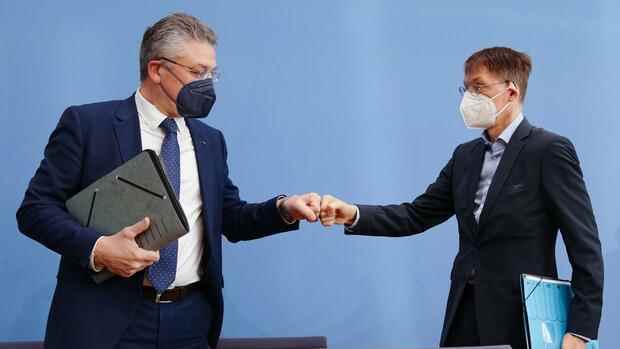Berlin Federal Health Minister Karl Lauterbach (SPD) defended the federal-state resolutions to contain the corona virus, but warned of a fifth wave. “We manage to get the delta wave slowly but well under control,” said Lauterbach on Wednesday in the joint press conference with the head of the Robert Koch Institute, Lothar Wieler.
“Nevertheless, we now have to assume that the Omikron wave can no longer be prevented.” All necessary measures would be considered, he said when asked whether stricter lockdown measures were necessary. “There are no red lines.”
The most important part of the strategy is the booster vaccination. At present, 28.5 million people would have received a third vaccination – the target announced by the federal government of giving 30 million booster vaccinations by the end of the year is within reach. Foreseeable, however, 60 million people would have to receive a booster vaccination. This “dramatically decelerates the progress of the pandemic and also protects the unvaccinated”.
In order to slow down the rapid spread of the Omikron variant, the federal and state governments had decided to further restrict private and public life. But they should only apply after Christmas. From December 28th at the latest, an upper limit of ten people should generally apply for private meetings.
Top jobs of the day
Find the best jobs now and
be notified by email.
Chancellor Olaf Scholz (SPD) also agreed with the state premiers to close clubs and discos and to allow football matches and other major events to take place without an audience. On January 7th, Scholz wants to meet again with the country chiefs to discuss how to fight the pandemic.
Dispute with the RKI
Shortly before the federal-state round, the RKI had called for much more far-reaching measures, including immediate maximum contact restrictions.
Despite the uncertainties that still exist, initial analyzes indicated that Omikron could identify the majority of cases of infection in Germany as early as January 2022, the RKI announced. There could be tens of thousands of infections every day through Omikron. Under the current conditions, the doubling time in Germany is around three days.
The RKI statements sparked criticism during the federal-state consultations. Lauterbach said in the switch that there was no scientific censorship, but that the publication was “not coordinated”. That shouldn’t happen. In the federal press conference with RKI boss Lothar Wieler, Lauterbach expressed himself more cautiously. When asked whether he still stood by Wieler, he said: “Otherwise he wouldn’t be sitting here.” Wieler defended his approach. It is part of the institute’s task to issue recommendations on a regular basis.
He also expressed concern about the pandemic. “With Omikron, a wave of infections with a previously unseen dynamic must be expected,” he said. With a doubling time of three days, the variant could be dominant in three weeks at the latest.
“If it is not possible to dampen the dynamics of the omicron wave, the health system and the critical supply structure must be overburdened,” he said. “Christmas is not supposed to kindle the Omicron fire.” The measures decided would, however, help to contain the infection rate.
Experts are dissatisfied
Not only the RKI considers stricter measures to be necessary. Baden-Württemberg, governed by the Green Minister-President Winfried Kretschmann, and Saxony, governed by the CDU Prime Minister Michael Kretschmer, made their dissatisfaction with the results of the conference clear in a protocol statement.
“They do not guarantee sufficient capacity to act to be able to react quickly to a worsening situation, as forecast by the Scientific Expert Council in its statement of December 19, 2021,” it says. Both states called on the federal government and the Bundestag to give the states all legal options for action again.
Kretschmer spoke of a “missed opportunity”. He assumes that there will be a need for further action before the next federal-state round on January 7th. “From my point of view, it is to be expected that January 7th will be too late. The momentum we are currently experiencing is very high. ”He believes that there will be votes and discussions beforehand.
Several countries have already announced that they will implement the contact restrictions earlier because of Omikron. In Mecklenburg-Western Pomerania, for example, they take effect on Christmas Eve, in Baden-Württemberg immediately after the Christmas holidays, i.e. on December 27, as Prime Minister Winfried Kretschmann (Greens) said. In Hamburg they apply before Christmas.
According to the Frankfurt virologist Martin Stürmer, the resolutions come too late. “With the doubling rate that Omikron shows, every day is important,” said Stürmer on Wednesday on Deutschlandfunk. Omikron was not just a threat since yesterday. Politicians could certainly be accused of having “overslept again” with the late meeting.
Omicron infection in the Bundestag
He doesn’t believe “that we can send out the signal to relax”. The signal is conveyed, “We can still relax over Christmas, then we will apply the brakes again”. There are resolutions that again did not come in time to break a wave. “I would have wished for more,” said Striker.
In addition to Lauterbach, Transport Minister Volker Wissing (FDP) also promised that the measures could be tightened again. “We are always ready to adjust to the new situation with additional contact restrictions, if necessary,” said Wissing in the ARD.
Omikron is a new challenge and politicians have to be flexible enough to react quickly. At Christmas, however, Wissing relies on personal responsibility: “Everyone has to decide for yourself.” Contacts that should be avoided should also be avoided. “We are very confident that people have internalized that too.”
In the meantime, the Omikron variant has also reached the Bundestag. According to information from the body, two MPs with a Covid 19 infection that was not recognized at the time, including the two variants Delta and Omikron, took part in the constituent meeting of the Defense Committee.
The politicians wore masks at the meeting last Wednesday, but usually remove them when speaking.
More: Comment: Scholz raises the alarm about Omikron – and delivers weak resolutions
